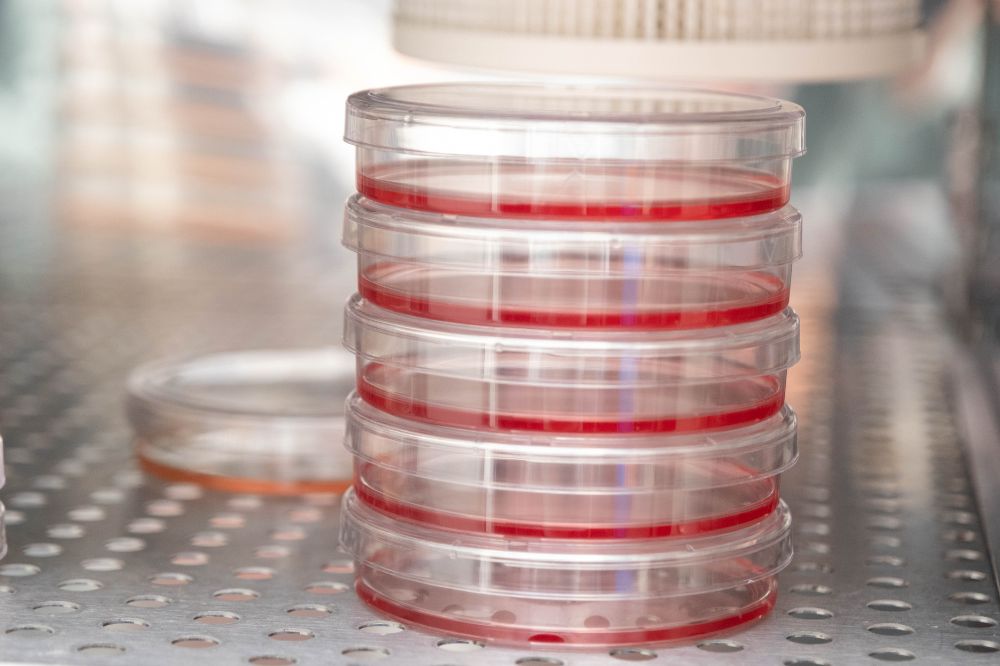
Cell culture plates in the Roeder lab where scientists recently studied gene expression in breast cancer. (Credit: Lori Chertoff)
Cells are regularly faced with environmental stresses that may damage or destroy them. To survive, they quickly adjust their gene expression to protect themselves. This is especially true for cancer cells, which must contend with a microenvironment that is inherently uncongenial. Yet they can thrive in these conditions, turning on genes that help them to develop into larger tumors or spread to other parts of the body.
How cancer cells manage to turn a dire situation into an advantage has been unknown. Rockefeller researchers thought clues might lie in teasing out how the gene transcription machinery senses the stressful environment and then changes course. Now they've discovered a molecular switch in breast cancer cells that reprograms the genetic production line towards tumor growth and stress resistance.
This finding, published in Nature Chemical Biology, presents a potential new target for cancer therapies.
"This previously unknown transcription-level mechanism helps the cancer cells survive stressful conditions, so targeting it could disrupt a key survival mechanism that some cancers rely on," says first author Ran Lin, a research associate from the Laboratory of Biochemistry and Molecular Biology at The Rockefeller University. "It's another example of how basic research can open promising therapeutic avenues."
"We found that this molecular switch is mediated by a generic transcription complex normally required for all protein-coding genes," says Robert Roeder, head of the lab. "But what was most unexpected is that its individual subunits can be repurposed for several physiological functions-including a function that allows cancer cells to survive and grow in high-stress environments."
Transcription services
RNA polymerase II, aka Pol II, is the machinery that transcribes protein-coding genes in eukaryotes. Discovered by Roeder decades ago, Pol II often teams up with the Mediator complex-a large transcriptional coactivator protein composed of 30 subunits-to initiate transcription, the first step in creating mature RNA. Further edits can come from so-called post-transcriptional modifications, which can also alter gene expression.
One key subunit of the complex is MED1, which is essential for Pol II transcription in different types of cells-including estrogen receptor-positive breast cancer (ER+ BC), one of the most common forms of the disease.
Previous research on ER+ BC from Roeder's lab has shown that estrogen receptor interactions with MED1 drive gene activation-so much so that they can render otherwise promising cancer drugs ineffective. These findings made Lin wonder whether MED1 played a role in helping cancer cells stay alive, and even thrive, in stressful conditions.
Lin decided to explore whether MED1 is acetylated. Acetylation is a biochemical modification that involves adding an acetyl group to a protein, which can alter its function, and is increasingly being recognized for its seemingly influential role in tumor development, metastasis, and drug resistance.
After determining that MED1 is indeed acetylated, he next aimed to understand how this modification influences its function, especially under cellular stress. They subjected the cells to different types of stress conditions, including hypoxia (lack of oxygen), oxidative stress, and thermal stress.
Altering the acetyls
They discovered that under stress, a protein called SIRT1 removes acetyl groups from normal MED1. This "deacetylation" enables MED1 to interact more efficiently with Pol II, leading to the elevated potential for activation of protective genes.
They also created a mutant form of MED1 that lacked six specific acetylation sites, making it unable to be acetylated. They then introduced this mutant protein into ER+ breast cancer cells in which the endogenous MED1 had been removed using CRISPR.
They found that regardless of how the MED1 became deacetylated-either through stressful conditions or by removing its ability to become acetylated-the breast cancer cells with deacetylated MED1 formed faster-growing and more stress-resistant tumors.
"Our work reveals that the acetylation and deacetylation of MED1 act as a regulatory switch that helps cancer cells reprogram transcription in response to stress, supporting both survival and growth," Lin says. "In cancer-particularly in ER+ breast cancer-this pathway may be co-opted or intensified to support abnormal growth and survival. We hope these insights will inform future drug development, especially for breast cancers and possibly other malignancies that rely on stress-induced gene reprogramming."
"This MED1 regulatory pathway appears to be part of a wider paradigm in which acetylation regulates transcription factors," Roeder adds. "Our earlier work on p53 helped establish that principle. Continuing to probe these basic mechanisms is what allows us to identify pathways that may eventually be leveraged for therapeutic purposes."






